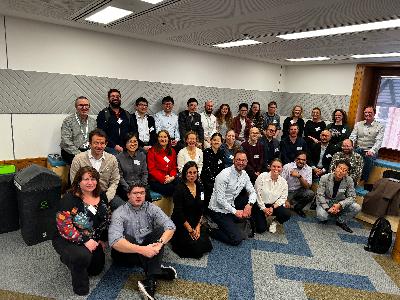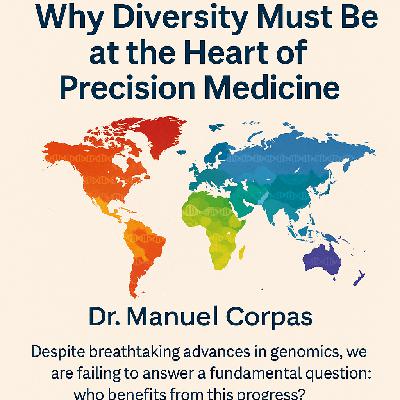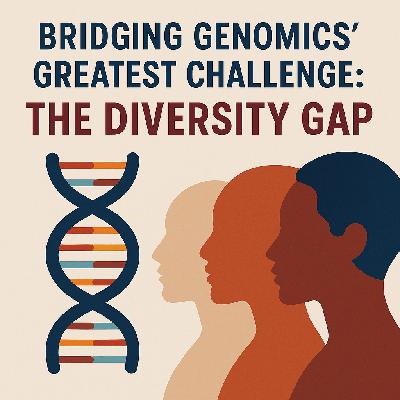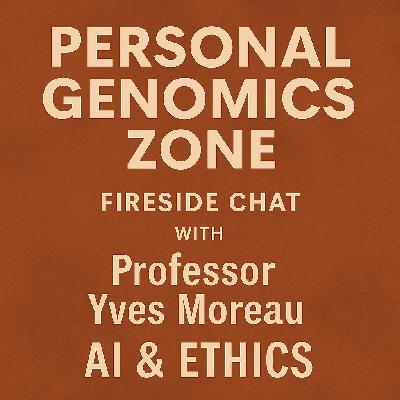Genomics and Big Data: The Next Frontier in Precision Medicine
Description
By Dr. Manuel Corpas
Introduction
Good afternoon, everyone! Welcome to this exploration of genomics, big data, and how they’re reshaping the future of healthcare. As I record this on the last day of January 2025, it strikes me that today—this moment—will never come again. It’s a reminder that science and technology, like time, keep moving forward. My hope is that revisiting some fundamentals of genomics will help reinforce our collective understanding and passion for this ever-evolving field.
<figure class="wp-block-embed is-type-video is-provider-youtube wp-block-embed-youtube wp-embed-aspect-4-3 wp-has-aspect-ratio">
<figure class="wp-block-audio"><figcaption class="wp-element-caption">Genome Medicine Lecture at University of Westminster</figcaption></figure>
Meet the Speaker
I’m Dr. Manuel Corpas, a senior lecturer in genomics with over 20 years of experience. I hold a PhD from the University of Manchester and spent four years as a postdoctoral researcher at the University of Cambridge. For the past three and a half years, I’ve been part of the University of Westminster, where I delve into big data and genomics—both as a lecturer and through my own company, which assists clinics in leveraging genetic data to understand diseases and predispositions. If you’re keen on the intersection of data science and biology, feel free to get in touch; I’d be delighted to discuss projects or career options with you.
Why Genomics Matters
Genomics is transforming medicine by bringing us closer to precision medicine, sometimes referred to as personalized medicine. Rather than relying on a one-size-fits-all approach, clinicians can increasingly tailor treatments to an individual’s genetic makeup. The ultimate aim is to prescribe the right drug, in the right dose, at the right time—something that becomes more feasible as we learn how genetic variants affect metabolism, drug response, and disease risk.
However, there’s a critical challenge: much of our understanding of genomics—and many commonly used treatments—derive from studies primarily focused on Northern European ancestries. This leaves other populations underrepresented in genomic research. It’s essential to include diverse genetic backgrounds if we want equitable healthcare for everyone, regardless of geographic location or socioeconomic status.
From Rare Disorders to Complex Diseases
My own work in the field began in 2008, analyzing next-generation sequencing data to diagnose rare genomic disorders. For instance, I’ve been part of a project that sequenced 13,000 children with rare disorders (and their parents), creating an informatics infrastructure that remains in use to this day. Although rare disorders (often called Mendelian or monogenic diseases) can be linked to a single gene, their cumulative impact is significant—and identifying the exact genetic cause offers immense value to families, clinicians, and researchers.
Yet the real population-level burden comes from complex (polygenic) disorders, such as Type 2 diabetes, coronary artery disease, and many cancers. These conditions involve numerous genes and are also shaped by environmental factors like diet, exercise, and exposure to toxins. Genome-wide association studies (GWAS) help us identify which genetic variants (or SNPs, single nucleotide polymorphisms) correlate with higher risk. The result is a deeper understanding of how certain people develop certain diseases—and why individuals in the same environment can have dramatically different outcomes.
The Data Explosion
If you’ve ever used Google Maps, you’ll appreciate the power of having a reliable reference map. The Human Genome Project gave us an initial “map” of our DNA, but that was just the beginning. Sequencing a single human genome today generates about 200 gigabytes of data—exponentially more than we can manage in a simple spreadsheet. With large-scale projects now sequencing tens or hundreds of thousands of people, data storage and interpretation have become gargantuan tasks, often measured in petabytes.
The good news is that the cost of genome sequencing has dropped even faster than computer processor power has increased under Moore’s Law. What cost billions of dollars 20 years ago can now be done for under $1,000, and it continues to get cheaper. This is ushering in a whole new era for precision medicine, but it also means we need more data scientists, bioinformaticians, and computational biologists to interpret the data flood.
Equitable Access and Future Directions
One of my biggest concerns—and greatest passions—is making sure the benefits of genomic medicine reach everybody. Cutting-edge tools and treatments need the right infrastructure, supply chains, and trained professionals. In many parts of the world, even basic healthcare resources are limited. How do we bring complex genomic diagnostics and personalized treatments to remote communities or regions with fewer technological resources?
Despite these hurdles, progress continues. In the UK, we’ve seen initiatives like the 100,000 Genomes Project, followed by mass-scale efforts involving half a million genomes—some of the largest in the world. Soon, it’s likely that every newborn will have their genome sequenced. We’ll enter an era where everyone’s DNA is on record from day one, offering unprecedented opportunities for preventive healthcare and personalized treatment. The challenge then becomes interpreting all that data: distinguishing benign variants from dangerous ones, predicting how genetic backgrounds affect drug metabolism, and using AI-driven models to provide actionable insights.
Computational Literacy: A Key to Tomorrow’s Jobs
For those of you pursuing careers in life sciences, I can’t emphasize enough the importance of data literacy. Being comfortable with big data tools and computational methods gives you a tremendous advantage in this field. The future belongs to those who can navigate datasets too large for any single human to analyze by eye. Whether you’re interested in rare diseases, cancer genomics, or population-level studies, computational skills will open more doors than ever.
Conclusion
Genomics isn’t a magic crystal ball predicting who will inevitably develop a particular disease. But it offers powerful insights into probabilities, risk stratification, and targeted therapies. It helps us see how each patient’s DNA interacts with their environment. Most importantly, it pushes medicine to become more proactive and patient-centered.
As the last day of January 2025 fades into history, I’m reminded that time stands still for no one—just as scientific progress keeps accelerating. By embracing genomics, data science, and a commitment to equitable healthcare, we can chart a path toward a future where “precision medicine” truly means medicine for everyone.
Thank you for reading, and I hope this glimpse into the world of genomics inspires you to explore new questions and possibilities. If you’re passionate about big data, genetics, or the future of personalized healthcare, let’s keep the conversation going.
Author Bio
Dr. Manuel Corpas is a senior lecturer in genomics with over two decades of experience. He earned a PhD at the University of Manchester and served as a postdoctoral researcher at the University of Cambridge. Currently at the University of Westminster, he also leads a company dedicated to helping clinics harness genetic data for diagnosing rare diseases and assessing predispositions to more common health conditions. Dr. Corpas is committed to expanding equitable access to genomic medicine worldwide.
























